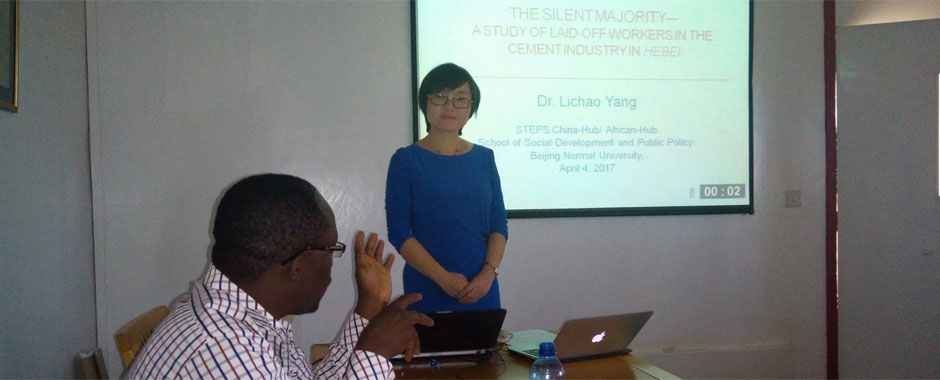In early April I visited Nairobi for a four-day exchange visit to the African Centre for Technology Studies (ACTS), as part of a project on Transformative Pathways to Sustainability funded by the World Social Science Council (ISSC).
The project explores different sustainability challenges in 6 countries (Kenya, China, UK, Mexico, Argentina and India). The China and Africa hubs are both exploring issues related to energy and climate change, so we are ‘paired up’ to share our learning in more depth. The point of the pairing is for us to learn from each other about research methods and findings, so the exchange visit is an important part of the project.
I am currently leading the China hub, while Dr. Joanes Atela leads the Africa hub. The Africa hub has been focused on understanding the sustainability challenges facing solar energy in Kenya, with a specific interest in mobile enabled payments for solar home systems (SHS). The China hub’s research, meanwhile, focuses on the social impacts of the closure of hundreds of cement factories in a bid to cut air pollution and carbon emissions, as part of its ‘ecological civilisation’ agenda. This builds on a longer history of engagement between the two hubs on energy and climate change.
Since Kenya and China have some political and market commonalities around solar and general green growth discourses, we are seeking to undertake some comparative analysis between the Kenyan and China work. As such, I hope my experiences and learning from this visit will provide some basis for triggering this comparison.
On the first day of my visit, colleagues in African-hub gave me an orientation and introduction of ACTS, the Africa hub and most importantly, their experience of convening the first Transformation Lab (T-Lab) in Nairobi in March 2017.
Very similar to the first T-Lab conducted in China, the Kenya T-lab was held for 2 days, and brought together a diverse group with different forms of expertise related to solar home systems and Kenya’s energy policy. Participants had come from the fields of research, policy-making, NGOs, the solar industry, business incubation, journalism and the law. In China, we had hosted participants who are different stakeholders in air pollution control, including laid-off workers, farmers, local government officials, scholars, NGO workers and journalists.
In both settings, the T-Labs provided a platform for social change by allowing different interest groups to share their knowledge, experiences, interests and solutions to particular sustainability issues. In Kenya, the T-Lab identified a number of political, technical and social challenges for solar home systems in providing sustainable, pro-poor energy access. At the T-Lab, they analyzed each problem, and also tried to explore the intrinsic links between these problems. They applied the ‘World Café’ method, which involved small group discussion with participants moving between themes clustered around tables.
I also introduced the experiences of our first T-Lab in China. In particular, I explained the participatory methods and tools that we applied in our sessions. I think the World Café is a very good idea that has not yet been applied much in China. We will consider applying it in our next T-Lab in November 2017.
On the second day of my visit, I gave a talk entitled “The Silent Majority in China’s Green Transformation: A study of laid-off workers in the cement industry in Hebei”.
China has been the most important national actor in the global green transformation and its leadership is of vital importance to the whole world. But the social impact of the country’s rapid transformation, especially the social justice implications for poorer and marginalized groups, have largely remained unnoticed and unstudied. This is the major research topic that we raised in our ISSC project in China.
I hoped to share China’s development experience, especially the lessons, with our Kenya colleagues, so that we can rethink the Chinese development mode and try to develop a more sustainable pathway towards development. The whole session lasted 2.5 hours, and the audience asked very interesting questions – not only about challenges we identified in China’s development process, but also regarding China’s development strategies in Africa.
We truly learned a lot from each other. I left Nairobi with lots of good memories, and wish I could return again very soon.

Dear Prof. Lichao Yang, as one of your former students at the School of Social Development and Public Policy, BNU, let me extend my heartfelt thanks and appreciation to you and the China-Africa hubs for the brilliant ground breaking research work. I believe this initiative will foster high-level learning and experience sharing between China and Africa (not only Kenya) on sustainable green transformation on both sides. In Liberia, country that had experienced devastating political upheavals and health disasters, such a project is seriously significant and i hope you can extend the to other African countries particularly Liberia.
Having sat in your Gender and Development and introduction to Chinese Development and Cultures (ICDC) classes, i have explicit confidence in your abilities to undertake state-of-the-art and breaking research in China green transformation and share important policy insights to the Chinese government and others.
Thank and i hope to hear from you.